Maple Leaf Foods Inc. announced the company is building a $310 million plant-based food processing facility in Shelbyville, Indiana, with the help of government and utility loans. The company already has meat-alternative brands like Lightlife and Field Roast, but hopes to expand its business into the increasingly popular plant-based protein industry.
“With Lightlife and Field Roast, we own the leading brands in the North American refrigerated plant-based protein market,” said Michael H. McCain, President and CEO of Maple Leaf Foods. “This investment will secure our ongoing leadership in this rapidly expanding market. By establishing a large-scale North American network, we will continue to meet rapidly growing demand for delicious protein alternatives and create a centre of excellence for innovation.”
Maple Leaf Foods is mostly recognized for its line of prepared meat products. However, the company revamped its portfolio in 2017 when they bought out two plant-based companies with hopes to expand their clientele under their Greenleaf Foods line. Since then they have marketed popular plant-based items such as their Lightlife pea-protein burger.
According to Maple Leaf Foods, plant-based protein makes up $1 billion dollars in the North American market, with refrigerated products representing 24 percent, with a 40 percent sales growth in 2018. As more consumers, especially younger generations draw themselves to convenience and a flexitarian lifestyle, the alternative protein market will likely grow exponentially in the years to come.
Furthermore, the plant-based processing facility received $50 million in grants from the government and other utility services, with $9.6 million covering start-up costs and $40 million in operational support.
Maple Leaf Foods is also investing an estimated $26 million in their existing facilities to keep up with the growing demands for their original product lines.
In addition, the new plant-based facility is expected to double Maple Leaf Foods’ current production line of faux-meat food items such as tempeh, franks, sausages, raw food and their leading plant-based burger.
The new plant-based processing facility is expected to employ around 460 workers with construction taking place later this spring and production starting in the fourth quarter of 2020. The company hopes this new operation will help them lead North America’s fastest growing product market.
Although not every consumer is vegetarian or vegan, Millennials and Generation Z are gravitating towards plant-based options due to the common health and sustainability benefits associated with these diets. Food industries who expand their portfolio to include alternative proteins will likely leverage financial gain over industries who don’t keep up with such emerging food trends.












Join or login to leave a comment
JOIN LOGIN